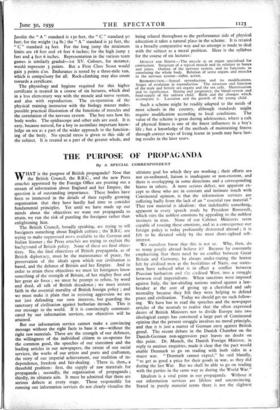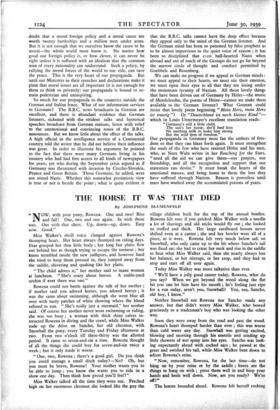THE PURPOSE OF PROPAGANDA
By A SPECIAL CORRESPONDENT
NVHAT is the purpose of British propaganda? Now that the British Council, the B.B.C., and the new Press attaches appointed by the Foreign Office are pouring out a stream of information about England and her Empire, the question is of outstanding importance. These bodies have been so immersed in the details of their rapidly growing organisation that they have hardly had time to consider fundamental principles. Yet until we have made up our minds about the objectives we want our propaganda to attain, we run the risk of puzzling the foreigner rather than enlightening him.
The British Council, broadly speaking, are trying to tell foreigners something about English culture ; the B.B.C. are trying to make suppressed news available to the German and Italian listener ; the Press attaches are trying to explain the background of British policy. None of these are final objec- tives. No, the final objectives of British propaganda, as of British diplomacy, must be the maintenance of peace, the preservation of the ideals upon which our civilisation is based, and the defence of Britain and her Empire. And in order to attain these objectives we must let foreigners know something of the strength of Britain, of her mighty fleet and her great air force ; we must be prompt to refute, by word and deed, all talk of British decadence ; we must restore faith in the essential morality of British foreign policy ; and we must make it plain that in resisting aggression we are not -just defending our own interests, but guarding the sanctuary of civilisation against barbarian inroads. This is our message to the world. If it is convincingly communi- cated by our information services, our objectives will be attained.
But our information service cannot make a convincing message without the right facts to base it on—without the right raw materials. These are the strength of our defences, the willingness of the individual citizen to co-operate for the common good, the speeches of our statesmen and the leading articles in our newspapers, the extent of our social services, the works of our artists and poets and craftsmen, the story of our imperial achievement, our tradition of in- dependence, freedom and fair-dealing. , There is, then,, a .threefold problem: first, the supply of raw materials for propaganda ; secondly, the organisation of propaganda ; thirdly, its ultimate aim. It must be admitted that there are serious defects at every stage. Those responsible for running our information services do not clearly visualise the ultimate goal for which they are working ; their efforts are not co-ordinated, liaison is inadequate or non-existent, and there is overlapping in some directions and a corresponding hiatus in others. A most serious defect, not apparent ex- cept to those who are in constant and intimate touch with Continental opinion, is that the information services are suffering badly from the lack of an " essential raw material." That raw material is idealism: that indefinable something, apparent in every speech made by President Roosevelt, which stirs the noblest emotions by appealing to the noblest instincts in man. None of our Cabinet Ministers seem capable of rousing these emotions, and as a consequence our foreign policy is today profoundly distrusted abroad ; it is felt to be dictated solely by the most short-sighted self- interest.
We ourselves know that this is not so. Why, then, do so many people abroad believe it? Because by constantly emphasising that there need be no conflict between Great Britain and Germany, by always under-stating the horror felt by civilised men at the bestialities of Nazis, our states- men have reduced what is in effect a conflict between Prussian barbarism and tie civilised West, into a struggle between rival imperialisms. When sanctions were imposed against Italy, the law-abiding nations united against a law- breaker at the cost of giving up a cherished and safe neutrality because they felt they were helping to defend peace and civilisation. Today we should get no such follow- ing. We have but to read the speeches and the newspaper articles of the neutrals to realise that the often expressed desire of British Ministers not to divide Europe into two ideological camps has convinced a large part of Continental opinion that the present struggle involves no moral principle, and that it is just a matter of German envy against British greed. The recent debate in the Danish Chamber on the Danish-German non-aggression pact leaves no doubt on this point. Dr. Munch, the Danish Foreign Minister, in reply to anxious enquiries, made it clear that the pact would enable Denmark to go on trading with both sides in a major war. " Denmark cannot expect," he said blandly, " to get as good a price for their goods in war, as they did during the last War. But we shall be able to go on trading with the parties in the same way as during the World War."
Idealism is a vital point in our propaganda. Without it our information services are lifeless and unconvincing. Stated in purely material terms there is not the slightest doubt that a moral foreign policy and a moral cause are worth twenty battleships and a million men under arms. But it is not enough that we ourselves know the cause to be moral—the whole world must know it. No matter how good our foreign policy is, or how clever, it can never be right unless it is suffused with an idealism that the common man of every nationality can understand. Such a policy, by rallying the moral forces of the world to our side, can save the peace. This is the very heart of our propaganda. But until our Ministers in their speeches and declarations make it plain that moral issues are all important (it is not enough for them to think so privately) our propaganda is bound to re- main pedestrian and uninspiring.
So much for our propaganda to the countries outside the German and Italian fence. What of our information services to Germans? The B.B.C. news broadcasts in German are excellent, and there is abundant evidence that German listeners, sickened with the strident talks and hysterical speeches broadcast from German stations, listen with relief to the unemotional and convincing tones of the B.B.C. announcer. But we know little about the effect of the talks. A high official in the intelligence service of a Continental country told the writer that he did not believe their influence was great. In order to illustrate his argument he pointed to the fact that there were many Germans living in his country who had had free access to all kinds of newspapers for years, yet who during the September crisis argued as if Germany was threatened with invasion by Czecho-Slovakia, France and Great Britain. Those Germans, he added, were not sound Nazis. Whether this somewhat pessimistic view is true or not is beside the point ; what is quite evident is that the B.B.C. talks cannot have the deep effect because they appeal only to the mind of the German listener. And the German mind has been so poisoned by false prophets as to be almost impervious to the quiet voice of reason ; it has been so disciplined that even half-hearted Nazis when abroad and out of reach of the Gestapo do not go far beyond the narrow circle of thought and conduct permitted by Goebbels and Rosenberg.
We can make no progress if we appeal to German minds: we must appeal to their hearts, we must stir their emotion, we must open their eyes to all that they are losing under the monstrous tyranny of Nazism. All those lovely things that have been driven out of Germany by Hitler—the music of Mendelssohn, the poems of Heine—cannot we make them available to the German listener? What German could resist that lovely poem beginning "Mein Herz, mein Herz ist traurig"? Or "Deutschland ist noch kleines Kind "- which in Louis Untermeyer's excellent translation reads:
" Germany's still a little child.
The sun's her nurse-' she'll feed him No soothing milk to make him strong But the wild fires of freedom."
Our propaganda in Germany must fan the embers of free- dom so that they can blaze forth again. It must strengthen the souls of the few who have resisted Hitler and his men, who, as Nora Waln writes in her Reaching for the Stars, " need all the aid we can give them—our prayers, our friendship, and all the recognition and support that our statesmen can devise." It must break the hearts of the emotional masses, and bring home to them the loss they have suffered through Nazism. Reason is powerless until tears have washed away the accumulated poisons of years.











































 Previous page
Previous page